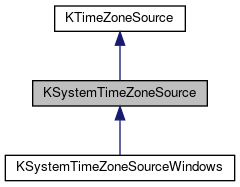KDECore
#include <ksystemtimezone.h>

Public Member Functions | |
| KSystemTimeZoneSource () | |
| virtual | ~KSystemTimeZoneSource () |
| virtual KTimeZoneData * | parse (const KTimeZone &zone) const |
 Public Member Functions inherited from KTimeZoneSource Public Member Functions inherited from KTimeZoneSource | |
| KTimeZoneSource () | |
| virtual | ~KTimeZoneSource () |
| bool | useZoneParse () const |
Static Public Member Functions | |
| static void | endParseBlock () |
| static void | startParseBlock () |
Additional Inherited Members | |
 Protected Member Functions inherited from KTimeZoneSource Protected Member Functions inherited from KTimeZoneSource | |
| KTimeZoneSource (bool useZoneParse) | |
Detailed Description
A class to read and parse system time zone data.
Access is performed via the system time zone library functions.
Reads and parses system time zone data
Definition at line 441 of file ksystemtimezone.h.
Constructor & Destructor Documentation
| KSystemTimeZoneSource::KSystemTimeZoneSource | ( | ) |
Constructs a system time zone source.
Definition at line 733 of file ksystemtimezone.cpp.
|
virtual |
Definition at line 739 of file ksystemtimezone.cpp.
Member Function Documentation
|
static |
- See also
- startParseBlock()
Definition at line 768 of file ksystemtimezone.cpp.
|
virtual |
Extract detailed information for one time zone, via the system time zone library functions.
- Parameters
-
zone the time zone for which data is to be extracted
- Returns
- a KSystemTimeZoneData instance containing the parsed data. The caller is responsible for deleting the KTimeZoneData instance. Null is returned on error.
Reimplemented from KTimeZoneSource.
Reimplemented in KSystemTimeZoneSourceWindows.
Definition at line 744 of file ksystemtimezone.cpp.
|
static |
Use in conjunction with endParseBlock() to improve efficiency when calling parse() for a group of KSystemTimeZone instances in succession.
Call startParseBlock() before the first parse(), and call endParseBlock() after the last.
The effect of calling these methods is to save and restore the TZ environment variable only once before and after the group of parse() calls, rather than before and after every call. So, between calls to startParseBlock() and endParseBlock(), do not call any functions which rely directly or indirectly on the local time zone setting.
Definition at line 762 of file ksystemtimezone.cpp.
The documentation for this class was generated from the following files:
Documentation copyright © 1996-2020 The KDE developers.
Generated on Mon Jun 22 2020 13:22:13 by doxygen 1.8.7 written by Dimitri van Heesch, © 1997-2006
KDE's Doxygen guidelines are available online.
 KDE API Reference
KDE API Reference